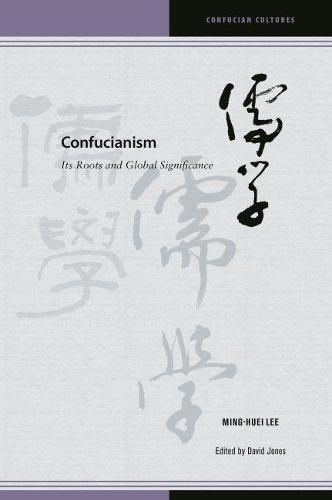Readings Newsletter
Become a Readings Member to make your shopping experience even easier.
Sign in or sign up for free!
You’re not far away from qualifying for FREE standard shipping within Australia
You’ve qualified for FREE standard shipping within Australia
The cart is loading…






In Confucianism: Its Roots and Global Significance, English-language readers get a rare opportunity to read in a single volume the work of one of Taiwan’s most distinguished scholars. Although Ming-huei Lee has published in English before, the corpus of his non-Chinese writings is in German. Readers of this volume will soon discover the hard-mindedness and precision of thinking so associated with German philosophy as they enter into his discussions of Confucianism. As readers progress through this book, they will be constantly reminded that all philosophy should be truly comparative… . The work is divided into three sections: Classical Confucianism and Its Modern Reinterpretations, Neo-Confucianism in China and Korea, and Ethics and Politics. These sections evince just some of the range of Ming-huei Lee’s thinking as well as his inclusive reach of Confucian philosophy to the whole of East Asia, especially to Korea. In the Ethics and Politics section, readers will get a taste for the return to his own tradition through the lens of Kantian philosophy with his analysis of Confucius and the virtue ethics debate in Confucian philosophical circles. Lee’s thinking through Mou Zongsan’s interpretation of Confucianism, Zhu Xi and the Huxiang scholars’ debate on ren, and the unfolding of the debates over the ‘four buddings’ and ‘seven feelings’ in Korea by Yi Toegye and Gi Gobong sets up the subsequent chapters of the book: a reconstruction of Wang Yangming’s philosophy and theories of democracy, and a critique of Jiang Qing’s ‘political Confucianism.’ His work in this book adds a sizable appendage to Confucian scholarship. Moreover, the interrelated ideas and arguments presented in this book are a special contribution to the Confucian project in English-speaking countries across the world. - from the Editor’s Foreword
$9.00 standard shipping within Australia
FREE standard shipping within Australia for orders over $100.00
Express & International shipping calculated at checkout
In Confucianism: Its Roots and Global Significance, English-language readers get a rare opportunity to read in a single volume the work of one of Taiwan’s most distinguished scholars. Although Ming-huei Lee has published in English before, the corpus of his non-Chinese writings is in German. Readers of this volume will soon discover the hard-mindedness and precision of thinking so associated with German philosophy as they enter into his discussions of Confucianism. As readers progress through this book, they will be constantly reminded that all philosophy should be truly comparative… . The work is divided into three sections: Classical Confucianism and Its Modern Reinterpretations, Neo-Confucianism in China and Korea, and Ethics and Politics. These sections evince just some of the range of Ming-huei Lee’s thinking as well as his inclusive reach of Confucian philosophy to the whole of East Asia, especially to Korea. In the Ethics and Politics section, readers will get a taste for the return to his own tradition through the lens of Kantian philosophy with his analysis of Confucius and the virtue ethics debate in Confucian philosophical circles. Lee’s thinking through Mou Zongsan’s interpretation of Confucianism, Zhu Xi and the Huxiang scholars’ debate on ren, and the unfolding of the debates over the ‘four buddings’ and ‘seven feelings’ in Korea by Yi Toegye and Gi Gobong sets up the subsequent chapters of the book: a reconstruction of Wang Yangming’s philosophy and theories of democracy, and a critique of Jiang Qing’s ‘political Confucianism.’ His work in this book adds a sizable appendage to Confucian scholarship. Moreover, the interrelated ideas and arguments presented in this book are a special contribution to the Confucian project in English-speaking countries across the world. - from the Editor’s Foreword